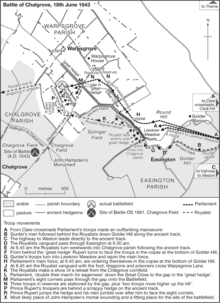Battle of Chalgrove Field
Hoping to capture a Parliamentarian convoy containing £21,000 in cash, during the night of 17 to 18 June Royalist cavalry from Oxford led by Prince Rupert raided positions around Chinnor.
The ease with which the Royalists conducted their raid, along with the failure to capitalise on the capture of Reading in April caused serious criticism of the Earl of Essex, Parliamentarian commander.
The Royalists focused on fortifying their wartime capital in Oxford and connecting key areas of support in England and Wales, while Parliament consolidated control of those they already held.
[4] The Royalist war effort was hampered by shortage of weapons, since Parliament held the largest arsenals in England and controlled most of the major ports, making it difficult to import them.
In February a large consignment of weapons purchased by Queen Henrietta Maria in the Dutch Republic landed in Bridlington, Yorkshire and preparations began to escort it to Oxford.
[6] The Royalists were also helped by sickness and hunger among the Parliamentarian troops and the unwillingness of Essex to act aggressively, claiming he could not move without additional supplies and money.
They found the garrison waiting and retreated; as they did so, Scots mercenary Sir John Urry defected, bringing information on the London convoy and Essex's troop positions.
Having inflicted 50 casualties, as well as capturing prisoners and stores, Prince Rupert decided to withdraw before his line of retreat was cut; by 06:30, his forces were on the road back to Oxford.
[9] While three troops under Hampden and Major John Gunter maintained contact with the Royalists, the local commander at Thame, Sir Philip Stapleton, hastily pulled together a force to attack them.
It also minimised his weaknesses, one being his cavalry's ill-discipline, which cost the Royalists victory at Edgehill, and led to defeat at Naseby; at Chalgrove, this was limited by their horses being exhausted after a night of hard riding.
The damage to his reputation was sealed when Rupert's men spent the next day at Chalgrove distributing their loot, and preparing for a triumphal entry into Oxford, while the Parliamentarian army looked on.

